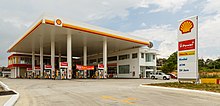Shell Nigeria
[2] Royal Dutch Shell's joint ventures account for more than 21% of Nigeria's total petroleum production (629,000 barrels per day (100,000 m3/d) (bpd) in 2009).In particular, when, in 1993 the Movement for the Survival of the Ogoni People (MOSOP) organized large protests against Shell and the government, it led to repression of the local community.The company has been responsible for some significant oil spills in the Niger delta, and both Nigerian and European courts have held them liable for environmental destruction.[5] In July 2013, Shell Nigeria awarded Kaztec engineering Limited a $84.5 million exploration and production contract for the Trans-Niger oil pipeline.[7] While it struggled with repairing the pipeline, Royal Dutch Shell announced a force majeure on Nigerian crude oil exports.[10] The concerns of the locals were that very little of the money earned from oil on their land was getting to the people who live there, and the environmental damages caused by the recurring sabotage of pipelines operated by Shell.[11] In 1993 the Movement for the Survival of the Ogoni People (MOSOP) organized large protests against Shell and the government, often occupying the company production facilities.Some of these arrested protesters, Ken Saro-Wiwa being the most prominent, were later executed, against widespread international opposition from the Commonwealth of Nations and human rights organisations.[12] The ethnic unrest and conflicts of the late 1990s (such as those between the Ijaw, Urhobo and Itsekiri), coupled with a peak in the availability of small arms and other weapons, led increasingly to the militarization of the Delta.By this time, local and state officials had offered financial support to those paramilitary groups they believed would attempt to enforce their own political agenda.[16] In 2009, Shell offered to settle the Ken Saro-Wiwa case with US$15.5 million while denying any wrongdoings and calling the settlement a humanitarian gesture.[39] In 1998, in its first public report on community and environmental issues in Nigeria, Shell promised "to end the practice of gas flaring in ten years, while pledging to establish a youth training scheme in Ogoniland".Therefore, the human and environmental impact of Shell's failure to properly clean up pollution cannot be defended by reference to illegal activity that, allegedly, caused the oil spills.[47] Court documents released in 2009 have revealed that in the 1990s, Shell routinely worked with Nigeria's military and mobile police to subdue resistance to its oil activities, often concerning Ogoniland activists, in the delta region.Many communities have reported being disappointed by the legal process due to lengthy delays and the Court's perceived favoritism for the oil company.[51] Chief Isaac Osaro Agbara, Oneh-eh Eta Ejaman XI, Emere Nkunna I of Eleme explained the fire by stating, "One early morning, there was a blow-out.The long-lasting environmental impacts, the health consequences of the oil spill, and the unfulfilled promises to take action ultimately led the Ejama-Ebubu community to file a lawsuit against SPDC in 2001.[53] Thirty years after the spill, in 2001, the Ejama-Ebubu community filed a lawsuit against Shell at the Federal High Court in Port Harcourt.These special damages include direct value lost due to the oil spill, such as the cost of renewable crops, loss of income, health problems, and desecration of shrines.The community's counsel, Emmanuel Asido Esq., explained that the case had been heard by two other judges before being presented to Justice Buba, resulting in a significant time delay.[54] Justice Buba ruled in favor of the community, requiring Shell to pay N15.4 billion in damages and restore the Ejama-Ebubu land to its pre-polluted state.[58] The following year, in 2017, the Court of Appeals at Port Harcourt ruled that SPDC needed to pay the Ejama-Ebubu community the damages plus interest.Gbemre and the community argued that the extraction of oil and the technique of gas flaring results in a polluted environment and unhealthy living space.The million tons of carbon dioxide and methane released into the atmosphere every year, as a result of gas flaring, have obviously polluted the air we breathe in this part of the world."[63] On 14 November 2005, the Federal High Court in Nigeria ruled in favor of the Iwherekhan community and declared that gas flaring was illegal.[70] Following this lawsuit, Shell and the Bodo community more actively engaged in negotiation efforts, but the process was continuously interrupted by competing interests.
SubsidiaryRivers StateParentShell plcNigeriaoil exploitationMovement for the Survival of the Ogoni PeopleOloibiriNiger Deltapalm oilforce majeurefossil fuelpipelinesextraction of petroleumNigerian National Petroleum CorporationTotalEnergiesConflict in the Niger DeltaKen Saro-WiwaCommonwealth of Nationshuman rightsRivers StatesNigerian governmentGreenpeaceNew York Timesecocidesoil pollutionNational Oil Spill Detection and Response AgencyAmnesty InternationalFriends of the Earth Internationalbig offshore oil fieldGlobal Witnesssub-Saharan Africagas flaringOgonilandhuman rights violations in Nigeriasummary executionarbitrary arrest and detentionMalaysiaNigerianoil spillcrude oilPort Harcourtspecial damagesgeneral damagesSupreme Court of NigeriaenvironmentalInternational Oil Companycontempt of courtNigerian Supreme CourtAfricaBusiness RecorderPeace Palace LibraryWayback MachineVogel, DShell AustraliaShell Energy AustraliaShell CanadaShell ChemicalsShell Gas & PowerShell USAMexican EagleMonteShellShell PakistanShowa Shell SekiyuWoodside PetroleumAera EnergyAlbian SandsBrunei Shell PetroleumBrunei LNGNorth West Shelf VentureOman LNGPearl GTLSakhalin EnergyAnglo-Egyptian OilfieldsAsiatic Petroleum CompanyCellanaMotivaShell-Mex & BPJiffy LubePennzoilQuaker StateRotellaV-PowerAsia BuildingBrent SparHancock Whitney CenterMontreal East RefineryOne Shell PlazaPlaza ShellRocky Mountain ArsenalScotford UpgraderShell BuildingShell CentreShell Centre (Calgary)Shell Development EmeryvilleShell HavenShell Mex HouseShell Pennsylvania Petrochemicals ComplexShell Technology CentreCorrib gas controversyWiwa v Royal Dutch ShellAndré BénardJohn JenningsM. King HubbertFred MeissnerGale NortonJorma OllilaRob RoutsAnswer ManFoundationGuidesIn situ conversion processLennard's Carrying v Asiatic PetroleumNovelty Service StationSpectacular signTurbo Chargers

